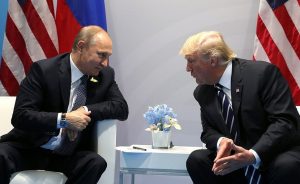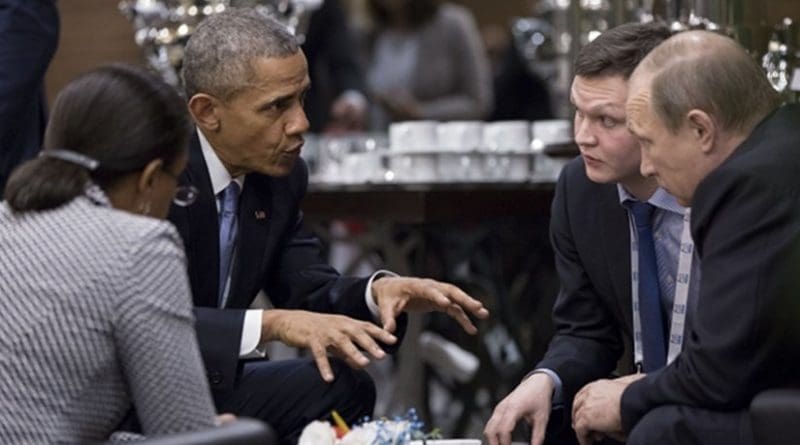‘All Politics Is Local’: US Policy Towards Russia – Analysis
US policy towards Russia has received a great deal of media coverage during the past couple of months ; however, the administration has not delineated its policy very clearly. Moving beyond campaign rhetoric, US strategy towards Russia faces an uphill battle, the main reason for this is the interplay between internal and external factors.
During the Obama administration, strides were made to ‘reset’ relations between the two global powers, though there was only a sliver of improvement in the ties, especially at the culmination of the new START treaty, which suffered from serious limitations.
Primarily, after the failure of this reset, Obama relied on policy based on maintaining peace while upholding the status quo so as to avoid tipping the balance. However, this American policy faced challenges with the change in leadership in Russia from Medvedev to Putin which altered Russian foreign policy; a policy which now focused on strategies that were and are more aggressive. The nation simultaneously became less willing to work with members of the international community. This dramatic shift also altered the strategy on missile defence.
While Medvedev was willing to allow Obama some leeway given institutional limitations, the hardnosed Putin was unrelenting. It was only towards the end of his term that Obama was pushed to set up the missile defence shield in Eastern Europe.
Additionally, change in Congressional leadership in the US, which shifted partisan lines further complicated US-Russian relations. In America’s legislative branch, there was a great deal support for rapprochement. So long as Obama had partisan control of Congress, the Republicans were far more critical of Obama’s strategy. Partisan allegiance became responsible for thwarting attempts at rapprochement.
The current policy/strategy towards Russia will be determined mostly as a result of the changing domestic scenario. The current internal situation – such as the alleged Russian involvement in the US election, the ties between the administration and Russia, the firing and resignation of Flynn and Comey, will have a bearing on the way in which US-Russian relations will be shaped.
As a result of the current confusion concerning Russia’s role in US politics, Congress has began to reassert itself over the Executive Branch on this issue. A newly introduced bill, which imposes additional sanctions on Russia, passed in the Senate in a near unanimous vote 97-2.
The overwhelming response is quite telling of the current political climate within the US. The imposition of sanctions was not without reason. Any Congressional action regarding Russia serves to appease the hostile domestic political environment. Cleverly, Democrats co-opted Russian Sanctions with the Iranian sanctions thus, effectively tying the President and his party’s hands. If Trump were to veto such sanctions it would look as though he was going soft on Iran as well.
However on a global scale, not everyone approves of this approach, members of the international community have also weighed in on this imposition of sanctions, specifically France and Germany. Some have condemned the sanctions as it could lead to a further degradation of the relations, possibly overflowing to other areas including the Syrian civil war and ISIS. US allies have weighed in on the current status of the relationship for instance, Israel, has expressed concern over deplorable state to which US-Russian relations have sunk

In framing a coherent foreign policy towards Russia, the Trump Administration will have to balance the foreign and domestic environment prudently through cohesive policy across the board.
The current political scenario, wherein in the balance in Congress is not completely in Trump’s favor has created roadblocks (in spite of Republican control). Though Trump has his partisan support, there are factions within the Republican party that are opposed to his dealing with Russia.
Of the Republican Senators who oppose Trump’s policies, Sen. John McCain (R-AZ) and Lindsey Graham (R-SC) are the two Republican representatives who vehemently criticize Trump’s policy towards Russia, which includes any kind of rapprochement as well as the alleged Russian interference in the election which lead to the need for a special prosecutor.
Democrats on the other hand, have cohesively opposed Trump’s handling of Russia. They also remain wary of Trump’s version of US commitment to NATO specifically, Eastern allies. Nevertheless, the imposition of new sanctions, to some extent, will require an alteration in Trump’s strategy towards Russia. Therefore, The President’s attempts to improve relations with Russia will be put on the back burner for the time being.
Secondly, along with his lack of domestic support, internationally, especially among US allies, skepticism has increased. Trump’s statements concerning NATO and Asian countries under the US nuclear umbrella during his campaign and thereafter at the NATO Summit have done little to mitigate these concerns. German Chancellor Angela Merkel in the aftermath of the Summit stated bluntly that reliance on the US was no longer dependable. During the Summit , the President in fact was playing a dual game of pulling up countries for their lack of burden sharing while simultaneously reaffirming US commitment to collective defence. This has led NATO allies to question US sincerity in its commitments to the alliance
In the NATO-Russia-US puzzle, Trump faces a conundrum of making concessions towards Russia, which could at least partially bolster relations, but on the other hand this would be next to impossible under current circumstances. Therefore Trump, has resorted to other tactics to portray his dismay with NATO. NATO and more specifically its Eastern flank, has been the bone of contention between the US and Russia. Towards the end of the Obama administration together with NATO, launched the missile defence in system in Romania, increased presence of NATO forces (which is considered the largest build since the Cold War) in Bulgaria, Romania, Poland, Estonia , Latvia and Lithuania, this has definitely contributed to the Russian apprehension.
The visit by President Trump to Poland, was a way to mend fences between the US and Eastern Europe, the visit was much awaited and was to a great extent warmly received. However this is not to sugar coat the problems that already exist between the two. The visit though may to some extent quelled the problem of mistrust in Poland, nevertheless there is a long way back one that the US may not want to take.
However though there is a great deal of ambiguity at this point in time, the US is committed to its NATO allies. However Russia has become problem for the US at home and abroad. Trump’s Russian problem can also be seen in terms of diverting attention away from the day to day functioning of government.
Conclusion
Therefore Trump’s policy towards Russia, is ‘ no policy’. This may not be such a bad idea, given that no policy is better than taking wrong turn , which could easily happen given the current situation. With regard to the reset this seems as a distant possibility for the time being, that is to say at least during this first term.
In fact the Comey hearings to a great extent have diverted attention from the actual policy. This could be a good thing in some respects given Trump himself is uncertain how to navigate the murky waters. To make matters worse US international, as well as domestic, allies have created more trouble than they are worth. For now, Trump faces the age old paradox of “dammed if doesn’t or dammed if he does”. His domestic environment is not conducive for rapprochement and in the international community, specifically the Baltic states, could further complicate the situation. Therefore, Trump’s policy towards Russia (during his first term) will be tied in with a polarised domestic environment.
**The title refers to a quote by Speaker of the House Thomas ‘Tip’ O’Neil
*The author is a Fulbright-Nehru Doctoral Fellow at the American University, Washington DC. She is also associated with the Centre for Canadian, US & Latin American Studies, JNU and the Institute of Peace and Conflict Studies (IPCS), New Delhi .

